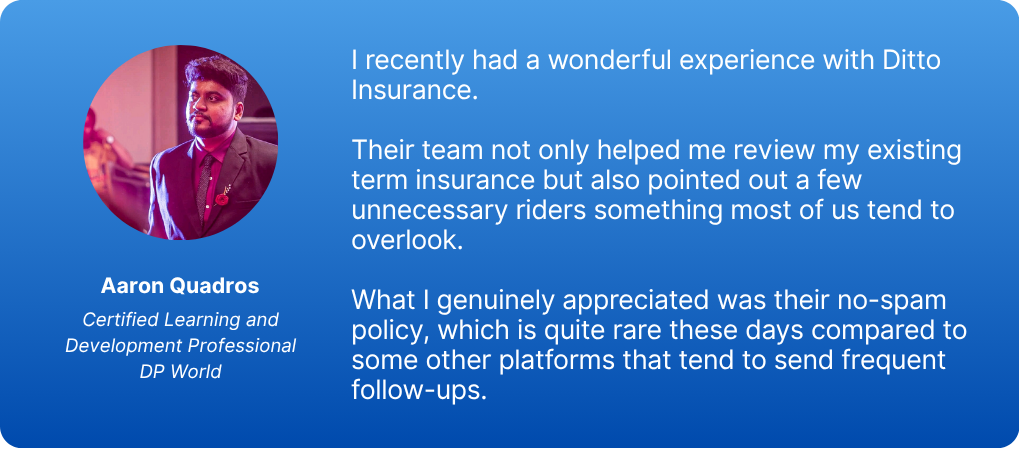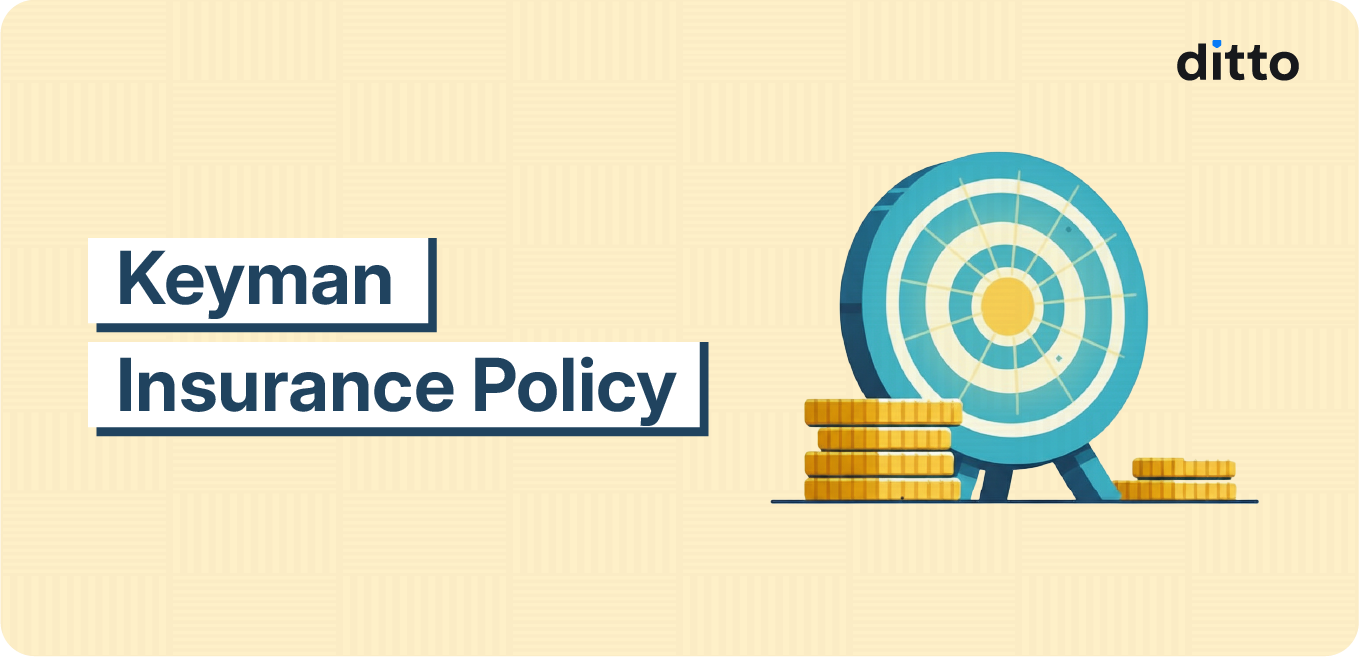Quick Overview
A keyman insurance policy, also called key person insurance, is designed to protect a business from financial disruption caused by losing a critical employee.
Unlike personal life insurance, where someone from the family (nominee) receives the payout, here the company is both policyholder and beneficiary. The cover ensures the business survives operational and financial shocks.
In this blog, we’ll explain who qualifies as a keyman, how the policy works, its features and eligibility rules, tax treatment, and how businesses can choose and structure the right keyman insurance policy for effective risk protection.
Who Is a Keyman?
The legal definition of a keyman insurance policy in India comes from the Income-Tax Act, 1961.
As per Section 10(10D), Explanation 1, “a life insurance policy taken by a person on the life of another person who is/was an employee or is/was connected in any manner with the business, and it includes policies that get assigned during the term.”
IRDAI has issued guidelines on how insurers should issue keyman policies (for example, restricting them to term insurance), but it does not provide a detailed statutory definition.
CBDT circulars also discuss keyman policies mainly from a tax treatment perspective and rely on the Income-tax Act definition.
What are Some Examples of a Keyman?
Typical examples include:
- Founders and co-founders
- CEOs, CFOs, and CXOs
- Top revenue-generating sales leaders
- Lead engineers or product heads
- Specialists maintaining critical client relationships
- Technical or research & development leaders driving innovation
Simply put, if losing one individual can materially harm the business, then that individual will qualify as a keyman.
What is the Purpose of a Keyman Insurance Policy?
It helps companies continue business by:
- Absorbing revenue losses
- Managing investor and stakeholder concerns
- Funding recruitment and training of replacements
- Repaying loans backed by the key person
- Stabilizing business operations
Without protection, the sudden loss of leadership or expertise can severely affect company valuation and operations.
Note: A keyman insurance policy protects a business, while a personal term policy protects a family. Since the payout goes to the company, not the employee’s family, the key person should also hold a separate personal term insurance policy to protect dependents. You can explore Ditto’s guide on the best term insurance plans for personal financial protection.
How Does a Keyman Insurance Policy Work?
- The company identifies a key employee.
- The company purchases the policy and pays premiums.
- The employee becomes the insured person.
- The company is the nominee/beneficiary.
- If the insured dies during the policy term, the payout goes to the company.
Claims are processed similarly to regular life insurance policies after document submission and verification.
Key Insight
What are the Eligibility Criteria for a Keyman Insurance Policy?
Basic Eligibility Criteria
- The insured must be an employee or director of the company.
- Their role must materially affect company performance.
- Employee consent is mandatory.
- Shareholding restrictions can apply, such as individual holdings should usually not exceed 51%, and combined family holdings often must stay below 70%.
- Coverage must reflect actual business risk.
Sum Assured Cap
Insurers usually restrict coverage to the lower of:
- A multiple of the average gross profit over the past 3 years, or
- A multiple of the average net profit over the past 3 years, or
- A multiple of the keyman’s annual compensation.
This ensures the keyman insurance policy's meaning remains aligned with business protection, not personal gain. Keyman insurance is usually not offered to loss-making companies; insurers may also have requirements on what is the gross profit margin of the company buying this policy.
Note: Keyman Insurance vs Employer Group Life Insurance
Documents Required
- Keyman Questionnaire
Duly filled and signed by the authorized signatory. This is the insurer’s core form that explains why this person is key. - MOA (Memorandum of Association)
To verify the company’s objectives and legal structure. - AOA (Articles of Association)
To confirm governance, powers of directors, and signing authority. - Certificate of Incorporation
Proof that the company exists and is registered. - Board Resolution for Keyman Insurance
Formal approval that the company is taking this policy, and who is authorized to sign. - Company PAN
For identity and tax linkage. - Employer KYC Documents
Standard KYC for the policy owner (the business). - Last 3 years' Audited Financials
Audited balance sheet and P&L for the company or partnership firm. This is used to justify the cover amount. - Beneficial Owner KYC and Declaration
Includes beneficial ownership declaration in the insurer’s required format. This is to meet anti-money laundering requirements and identify who ultimately controls/benefits from the business.

Features and Benefits of Keyman Insurance Policy
High Sum Assured With Caps
Coverage is linked to profits or employee compensation, ensuring meaningful but justified protection.
Company-Owned Policy
The company pays premiums, and they claim proceeds.
Fixed Policy Term
The policy term is typically aligned with how long the employee is expected to remain critical to the company.
Business Continuity Protection
The payout helps stabilize operations after an unexpected leadership loss.
Loan Protection
Businesses can repay loans secured against the key individual.
Investor Confidence
Insurance coverage signals prudent risk management to investors.
Non-transferability During Active Keyman Status
While active, a keyman insurance policy cannot usually be transferred, and reassignment happens only after resignation or retirement, when it may convert into a personal policy subject to insurer and tax rules.
Keyman Insurance Policy Taxability
- Premium Tax Treatment
Premiums paid by the business are deductible as business expenses under Section 37(1) of the Income Tax Act. - Death Benefit Tax Treatment
If the company receives the claim payout, it is taxed as business income.
Note: Assignment & Tax Treatment of Keyman Policies
How to Buy a Keyman Insurance Policy?
- Identify key individuals.
- Estimate the financial loss if they are lost.
- Decide appropriate coverage within insurer caps.
- Compare insurers offering keyman cover.
- Obtain employee consent.
- Complete underwriting and policy issuance.
Companies often purchase such policies through corporate insurance advisors.
Why Choose Ditto for Term Insurance?
At Ditto, we’ve assisted over 8,00,000 customers with choosing the right insurance policy. Why customers like Aaron below love us:

- No-Spam & No Salesmen
- Rated 4.9/5 on Google Reviews by 15,000+ happy customers
- Backed by Zerodha
- 100% Free Consultation
You can book a FREE consultation. Slots are running out, so make sure you book a call or WhatsApp now!
Conclusion
A keyman insurance policy is a powerful business risk-management tool, especially for startups and Small and Medium Enterprises (SMEs) that depend heavily on a few critical individuals. It helps protect business finances and maintain operational stability in the event of an unexpected loss of leadership.
However, the person covered under a keyman policy should remember that this policy protects the company, not the employee’s family, so a separate personal term insurance policy remains essential.
Also, based on Ditto’s research, insurers issue only term plans under keyman structuring, and riders such as critical illness or accidental death benefits are usually not available.
Disclaimer
Frequently Asked Questions
Last updated on:










